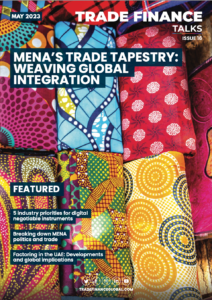Estimated reading time: 6 minutes
Listen to this podcast on Spotify, Apple Podcasts, Podbean, Podtail, ListenNotes, TuneIn
Factoring: An important finance product that is gaining popularity in recent years. While factoring is becoming more well-known, it is important to take proper steps to understand the legal framework that governs these transactions. Factoring laws play a critical role in determining the rights and responsibilities of the parties involved in a factoring arrangement, as well as the powers of financial institutions to provide various factoring products.
Of particular interest, the UAE recently passed a new factoring law, which marks a significant milestone for the trade and supply chain finance community. To break down the intricacies of factoring and to provide an overview of the UAE law, Trade Finance Global (TFG) spoke to Marek Dubovec, director at the International Law Institute and professor at the University of Arizona.
What is factoring?
Factoring is the financing of receivables, typically arising from a trade transaction where receivables are transferred to a factor that may be a bank or an NBFI. Traditionally, factoring entailed an outright transfer (absolute assignment) of receivables. The more recent understanding of factoring includes security transfers and pledges of receivables that may not necessarily arise from a trade transaction but may be generated from a sale or license of IP rights or provision of data.
Dubovec said, “Traditionally, factoring entailed absolute assignments or outright transfers of receivables generated by businesses. But more recently, those transfers have been extended to also encompass security assignments and pledges.”
Additionally, factoring laws are beginning to cover new elements as well. The UNIDROIT’s Factoring Model Law, adopted in May 2023, enables factoring companies to finance receivables arising from the use of intellectual property rights and from data transactions.
The development of international factoring standards has taken a while, in fact, it has taken four iterations of standards. The four most vital standards adopted in recent decades are:
- 1988: UNIDROIT Convention on International Factoring
- 2001: United Nations Convention on the Assignment of Receivables in International Trade
- 2016: UNCITRAL Model Law on Secured Transactions
- 2023: UNIDROIT Model Law on Factoring

Factoring in the UAE
The United Arab Emirates (UAE) has taken a significant step in modernising and reforming its legal regime for the financing of movable assets, including receivables. In 2016, the UAE enacted the Secured Transactions Law with the aim of creating a more efficient and transparent framework for financing movable assets. However, the law contained ambiguities and gaps that required revision.
To address these issues, the World Bank Group project engaged in a revision process that led to the enactment of a new Secured Transactions Law and Factoring Law in 2020 and 2021. The Factoring Law covers a wide range of transfers of receivables, including pledges and security transfers, and distinguishes receivables from other payment rights, such as negotiable instruments. It also overrides anti-assignment clauses, enabling suppliers to obtain financing on the back of receivables even when their transfer would be precluded by a clause in the supply contract.
The UAE has thus enhanced legal certainty for businesses engaging in factoring transactions. One example of an approach that creates a predictable environment is the requirement to publicly register a notice concerning a transfer in a registry operated by the Emirates Development Bank, promoting transparency and preventing multiple transfers of the same receivables. The time of registration determines priority conflicts between claims to the same receivable.
A notable aspect of the Factoring Law relevant to cross-border transactions is the clause that determines the applicable law for transfers of receivables based on the location of the transferor/assignor. This is important because factoring has become an international phenomenon, with many receivables being transferred across borders.
Factoring in markets around the world
As more countries and legislative bodies pass factoring laws around the world, it will create a domino effect. Dubovec is involved with multiple factoring projects globally and said, “These projects now follow the underlying principles for the UNIDROIT Model Law on Factoring, which means they extend their scope of application to a variety of transfers, not being limited to outright transfers, and to different types of receivables not being limited to trade-related receivables.”
This development helps create uniformity and harmonisation of factoring laws across multiple jurisdictions. However, this does not mean that there are no instances where the laws need to be flexible to accommodate prevailing practices in the relevant economy.
Dubovec said, “I’m engaged in a project to develop a factoring law in one jurisdiction where we have discussed with the Central Bank that the framework might need to be limited to outright transfers of receivables.”
Although the world is moving towards unification of factoring laws, different countries and different regions require unique approaches. Modernisation and harmonisation of factoring laws require a joint effort between governments, private sector actors, and multilateral institutions. Dubovec noted that the EBRD and the World Bank Group are actively supporting factoring law reforms in the Middle East and Central and Eastern Europe, Afreximbank is supporting such laws in Nigeria, and the Asian Development Bank is active throughout ASEAN.

The future of factoring is bright
As more and more economies adopt factoring laws, it is bound to have an impact on international trade and global markets. This development is coming at the right time as well, as the very structure of the trade finance and supply chain industry is undergoing changes.
Dubovec said, “The financing of trade has shifted over the past two decades away from instruments such as letters of credit and collections to more of open account financing.”
While the industry is experiencing a fundamental shift in practices, this requires regulatory adjustments, such as in the licensing of factoring companies as well. Dubovec believes that as more companies embark on factoring reforms and the practice becomes more accessible, SMEs and micro-enterprises will benefit from eased access to finance.
 Australia
Australia Hong Kong
Hong Kong Japan
Japan Singapore
Singapore United Arab Emirates
United Arab Emirates United States
United States France
France Germany
Germany Ireland
Ireland Netherlands
Netherlands United Kingdom
United Kingdom

























Comments are closed.